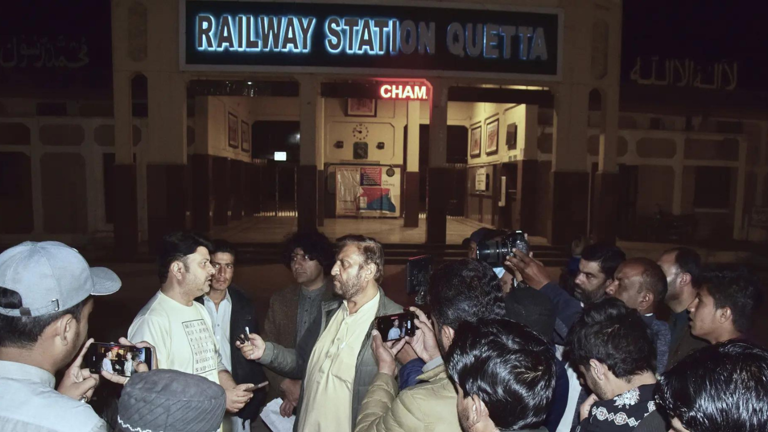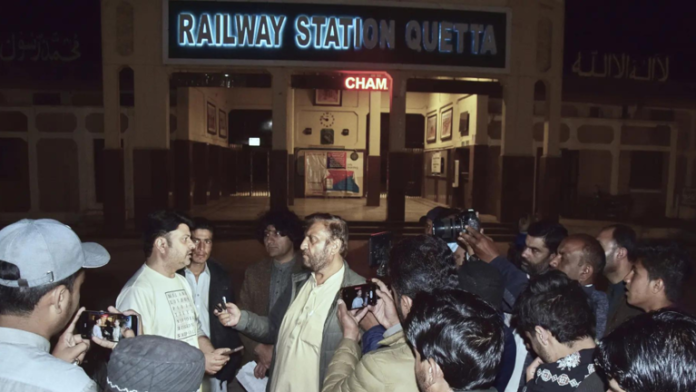Baloch rebels deny the Pakistan army’s report that the siege of the train has come to an end, maintaining that the hostages are still in captivity and the standoff continues. Tension builds as both sides provide conflicting updates on the situation coming to an end.

In a sensational turn of the current war between Baloch rebels and the Pakistan army, a recent standoff at a train hijacking in southwest Pakistan has increased tensions to a new level. The Pakistan army asserted that the siege was lifted and hostages were released, but Baloch separatist groups categorically denied this, claiming that the standoff was still very much active and the hostages were still in captivity.
The attack started when militants from the Baloch Liberation Army (BLA), a major separatist organization in the province, reportedly hijacked a train traveling along Balochistan, a province at the center of Balochistan’s decades-old rebellion. As reported, the train was attacked by militants, who were heavily armed, and took over the vehicle, holding many passengers captive, including government employees, civilians, and security personnel.
The Pakistan Army’s Statement
The Pakistani military first reacted to the crisis with force, sending special operations troops onto the train in an effort to retake control of the train and secure the release of the hostages. Following a tense standoff that lasted several days, the army released a statement announcing that the siege had been successfully ended, with all of the hostages released and the rebels escaping the area.
General Qamar Javed Bajwa, the head of Pakistan’s armed forces, made a press address in which he asserted that the military’s timely intervention had thwarted the danger, and things were in order. The army’s version put forth an image of a success story of an operation that rescued civilians successfully and inflicted a hit on separatist militants active in the area.
Counterclaim of Baloch Rebels
But the Baloch separatist movements, and most notably the Baloch Liberation Army, immediately challenged the account of the military. They released a series of video messages and statements denying that the siege was over. The rebels said the Pakistan army had “abandoned” the hostages to perish, blaming the military for not negotiating or arranging for the release of the arrested civilians. The BLA’s spokesman claimed that the hostages remained in their custody and that the standoff was hardly over.
The militants also accused the military of overestimating their success in an attempt to save face. “The military’s claims are just propaganda to hide their failure,” a BLA spokesperson said in a recent release. “Our fighters are still in command, and the hostages are still with us.” This is in sharp contrast to the Pakistan army’s description of a victorious outcome.
Strategic Significance of the Area
The Balochistan region has been a focal point for insurgent activity for decades, with Baloch separatists fighting for autonomy or independence from Pakistan. The province is endowed with natural resources in the form of gas, oil, and minerals, and is strategically significant because of its proximity to the Arabian Sea and the Persian Gulf. The government of Pakistan has long been resisted by Baloch nationalist groups that claim they have been deprived of a just proportion of the resources of the province and that their people have endured state repression.
The BLA and separatist groups have been the spearhead of the insurgency, perpetrating attacks against military installations, infrastructure, and government officials. The hijacking of the train is among the more daring operations conducted by such groups, pointing to the heightening tensions within the region. It also testifies to the military’s difficulties in holding control over Balochistan, one of the province’s areas of operation where central government control tends to be constantly challenged.
The Military’s Response to Rebel Claims
In reaction to the rebels’ assertions, the Pakistan army has stood firm on its stance. Authorities have insisted that the hostages were released safely and that operations to eliminate any remaining insurgents in the area are still underway. Although the military has not given details on the number of hostages who were rescued or the exact nature of the operation’s success, they have assured the public that the threat has been contained.
But local media and independent sources report that occasional clashes persist in the region, with both sides blaming the other for ceasefire breaches and undermining peace initiatives. Local Baloch leaders have also expressed alarm at the humanitarian situation, with reports of displaced families and casualties from the conflict.
The International Community’s Concern
The growing crisis in Balochistan has attracted international observers’ interest, especially that of human rights agencies and neighboring powers. The United Nations and various human rights agencies have appealed to both the government of Pakistan and the Baloch militant groups to initiate dialogue and guarantee the security and welfare of the hostages. These agencies have been worried about violence being used and the likelihood of increased escalation, which might destabilize the region even more.
China, which has heavily invested in the country via the China-Pakistan Economic Corridor (CPEC) project, has also been worried about the persistent unrest in Balochistan. The CPEC, which comprises major infrastructure development projects such as a deep-sea port in Gwadar, has been attacked by militant groups in the past. China has also made it clear that it is keeping a close watch on developments, as stability in Balochistan could jeopardize its investment and interests in the country.
The Political Consequences
The standoff between Baloch insurgents and the Pakistan military has serious political consequences for both Pakistan and the Baloch nation. The Baloch insurgency is regarded by most as a movement for self-determination and increased autonomy, with long historical origins tracing back to the 1947 partition of India. Baloch nationalist movements claim that their nation has been oppressed and marginalized by the central government in Islamabad, and most consider the actions of the military as part of an overall plan to repress Baloch identity and culture.
The government of Pakistan views the situation as a challenge to its writ, especially in a province that is crucially strategic. A failure to end the conflict through peaceful means will further erode the legitimacy of the central authorities and stoke further unrest. Internationally, Pakistan’s management of the crisis has implications for its relations with its neighbors, Afghanistan, Iran, and China, all of which have stakes in Balochistan’s stability.
The Standoff’s Future
With the situation still unfolding, it is uncertain when or how the standoff will be resolved. The differing accounts from the Pakistan military and Baloch separatists indicate that a resolution is not near, and both parties are likely to continue to follow their respective agendas. For the Baloch insurgents, hijacking the train is an open declaration of defiance, whereas for the Pakistani army, it is yet another among a lengthy array of assertions against its jurisdiction over the province.
With the hostages remaining at the heart of the standoff, the global community will continue to put pressure on both parties to find a peaceful solution, but the situation in Balochistan is extremely complicated. Until a negotiated agreement is found, the standoff persists, and the destiny of those in the middle remains uncertain.

